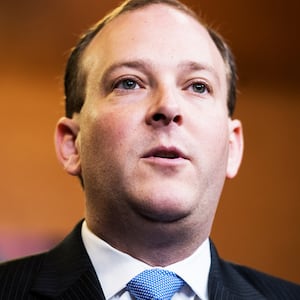The medical practice belonging to a New York congressman’s personal doctor pumped $60,829 into a federal political action committee that funneled the cash into his campaign for governor in violation of campaign-finance rules, The Daily Beast has discovered.
Documents filed with the state Board of Elections earlier this month show the donation dropped into GOP Rep. Lee Zeldin’s gubernatorial campaign coffers in November from the Conquering Cancer PAC, an outfit that formed last summer and, to date, appears to have never contributed to any other candidate. A Board of Elections spokesman told The Daily Beast that New York election law obligates any political committee giving more than $1,000 to a state or local candidate to register with authorities in Albany—and Conquering Cancer PAC has never done so, public records show.
Public records also show the leadership of Conquering Cancer PAC is intimately entangled with Zeldin himself; his own campaign treasurer manages the PAC, and the donations to it have come entirely from people tied to one medical practice. That practice is New York Cancer & Blood Specialists, headed by Dr. Jeffrey Vacirca, himself the PAC’s largest donor, though several other physicians associated with the practice also contributed to the $60,829 total.
It was Vacirca who gave a public statement confirming Zeldin’s own leukemia was in “complete remission” last fall, when the congressman revealed his cancer diagnosis and treatment. The statement identified the doctor, based out of Zeldin’s Long Island district, as the lawmaker’s personal hematologist.
Vacirca, a frequent contributor to Zeldin’s campaigns, rankled his own patients in 2018 by hitting them with robocalls urging them to back the Republican’s re-election.
Neither Vacirca nor any of the doctors at his sprawling New York City metro area practice responded to repeated requests for comment. Nor did Nancy Marks, the treasurer handling the books for both Zeldin’s campaign and the PAC.
The Conquering Cancer PAC was first filed with the FEC in July 2021 and almost immediately provoked suspicion from political observers.
The PAC’s own webpage reflects what purports to be a largely federal orientation. Its stated aims are to “maintain the integrity of the cancer care delivery process” and “[back] policymakers who support high-quality care, choice, and access for cancer patients and autonomy and fair reimbursement for community oncology practices.” To do that, the PAC says it will “grow a bipartisan presence in Washington, DC,” and “support the election and continued service of members of Congress.”
But Zeldin is forfeiting his seat in the House to seek the governorship, and even if he were to win, he would have virtually no influence on the federal Medicare policies that the site identifies as one of the PAC’s chief concerns.
Moreover, there is already an organization and attendant PAC addressing the same concerns of independent oncology practices that Conquering Cancer PAC identifies as its core mission. They are the Community Oncology Alliance and its committee, Friends of Community Oncology—and Vacirca is an executive at both, along with other practitioners from across the nation.
What need there is for a redundant PAC, particularly one giving money to a seemingly doomed gubernatorial candidate, is unclear. But a good government advocate noted that one characteristic of a PAC is that it can conceal the origins of donations to political candidates, which can be useful when candidates are unlikely to win. Zeldin is the frontrunner for the GOP nomination for governor, but likely to lose the general election this fall in the overwhelmingly Democratic state.
“It’s about anonymity and attempting to be more secretive about the contribution—and there’s two reasons for that,” said John Kaehny, executive director at Reinvent Albany, a reformist nonprofit. “You know [your candidate is] not going to win and you don’t want to offend the eventual winner. And it might be easier to solicit contributions, since you ask a colleague, ‘Can you donate to the make-our-business-better PAC,’ rather than identifying a candidate. Because they might say, ‘I don’t want to donate to that person, they’re going to lose.’”
Kaehny noted that there is neither any federal or state statute obligating political committees to be honest about their intention—and argued such a statute would be unenforceable even if it passed.
Zeldin’s campaign maintained to The Daily Beast they had no involvement in or knowledge of the formation of the Conquering Cancer PAC, and insisted it never solicited the donation.
Elected in 2014 as a union-friendly moderate with a military record, Zeldin once seemed to be among his party’s rising lights and possibly its strongest contender to recapture the governor’s mansion since GOP Gov. George Pataki exited office at the end of 2006. But Donald Trump’s consolidation of support in the Republican Party left the congressman, like many other Empire State Republicans, in a quandary: the Queens-born businessman is massively unpopular with New York’s general electorate, even as he remains beloved by the base.
Ultimately, Zeldin embraced the 45th president, fiercely defending him during his first impeachment proceeding and voting against certifying electors from Arizona and Pennsylvania hours after Trump supporters ransacked the Capitol last year. This makes Zeldin’s gubernatorial bid an even steeper climb in a state where Biden trounced Trump by 23 points in 2020.







